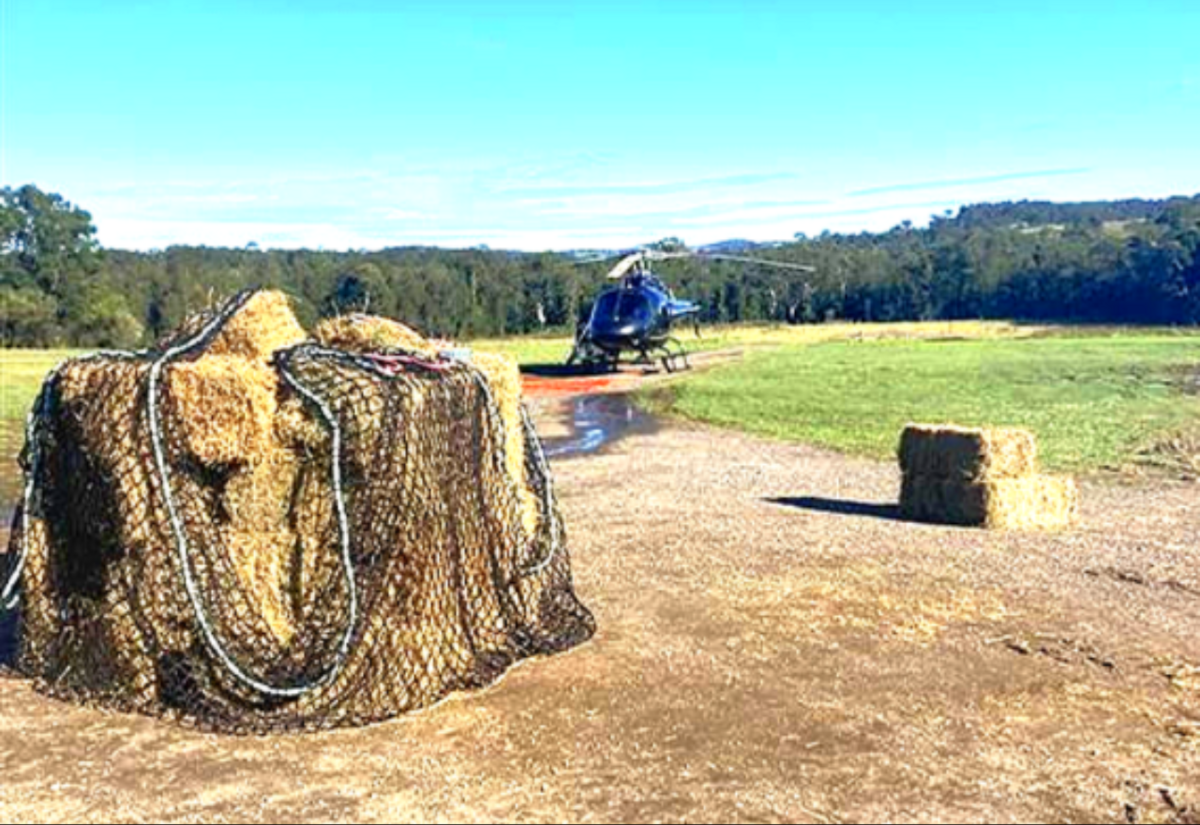Help begins as response transitions to early recovery for flood impacted communities
25 May 2025, 5:11 AM
 Farmers receiving fodder drops for cattle in isolated parts of the mid-north coast and Hunter. Photo: supplied
Farmers receiving fodder drops for cattle in isolated parts of the mid-north coast and Hunter. Photo: suppliedNow the weather has cleared across the NSW north coast and the extent of the damage caused by the recent weather event becomes apparent, the NSW Government has released a range of immediate support measures for individuals and families in flood-impacted communities across the state, with more to come in the following days, as early recovery commences.
Now that the peak of the emergency response has passed, the NSW Government’s focus is on ensuring that impacted people can access food and shelter, medicine and animal welfare support.
Immediate Health and Welfare support
- Individuals and communities that have become isolated and are in need of food or medical supplies should contact the NSW SES on 132 500 for assistance. In life threatening situations, call Triple-Zero (000).
- Food, accommodation, and connections with social services are available at evacuation centres. A list of evacuation centres is available at: ses.nsw.gov.au/during-an-emergency/evacuation-centres.
- People who have lost their prescriptions or prescription medicines, or can’t access their GP, can visit their local community pharmacy for a replacement for most medicines. For more information speak with your local pharmacy, GP or call Healthdirect on 1800 022 222.
- Landholders needing urgent animal welfare assistance should call the Agriculture and Animal Services Functional Area on 1800 814 647. Operating hours have been extended from 8am to 6pm daily.
Clean Up and Returning Home
As flood waters continue to recede, we understand people will be keen to inspect their properties, but we ask that they remain patient and await advice from NSW SES that it is safe to return. Strike teams are on the ground completing rapid impact assessments and coordinating a clean-up blitz.
Following safety assessments, roads will begin to reopen, supporting resupply to communities and returning home. If roads are blocked, please do not drive around barricades even if you cannot see water, as it may not be safe.
- The M1 has now reopened, with one lane in each direction. Please check livetraffic.com for the most up-to-date information on road closures before heading out.
- Returning home to flood impacted properties poses a number of health and safety risks. NSW Health has important advice about safe household clean up after a flood at: health.nsw.gov.au/emergency_preparedness/weather/Pages/household-cleanup.aspx.
- A coordinated plan to manage waste is being rolled out. Residents should leave waste at their kerb. Emergency services will be on hand in some areas to help move waste from homes to the kerb. Residents are encouraged to separate white goods and mattresses from other flood debris. Please wear protective clothing when cleaning or touching flood-damaged items or material. If there is any risk that waste contains biological or chemical hazards or asbestos contamination, please contact the NSW Environmental Protection Authority on 131 555 for advice.
- Before people start clean up, they should also take pictures of their properties to assist with insurance claims. Legal Aid NSW is providing free legal assistance to NSW flood victims through the Disaster Response Legal Service and can be contacted on 1800 801 529.
Recovery Assistance, Grants and Donations
- Recovery Assistance Points and Phase 1 of Commonwealth and State Government grants will commence shortly. More information will become available soon.
- If you want to help, the NSW SES partners with communities during a crisis to respond where help is needed most. In large-scale disasters, spontaneous volunteer groups and individuals are an integral part of supporting our communities with the right help at the right time. Find out more at: ses.nsw.gov.au/volunteer/spontaneous-volunteer
- Please donate responsibly to flood impacted communities. Unsolicited donations often end up warehoused or in landfill, making clean-up operations more difficult and costly for communities. GIVIT is working in partnership with the New South Wales Government, local councils and recovery organisations to help people in NSW affected by storms and flooding get the essential goods and services they need. To find out what is needed, visit: https://www.givit.org.au/take-action/ways-to-give/give-against-an-appeal/new-south-wales-flooding.
Mental Health Support
Importantly, take care of your mental health and encourage those around you to do the same. This a challenging time. If you or someone you know needs mental health support, contact:
- Lifeline on 13 11 14 for crisis support any time
- Beyond Blue on 1300 22 46 36
- 13YARN, run by Aboriginal people, on 13 92 76
- Transcultural Mental Health Line on 1800 648 911
- Kids Helpline on 1800 55 1800 (if you’re aged under 25)
- NSW Mental Health Line on 1800 011 511 to speak to a specialist mental health service.
Minister for Recovery Janelle Saffin MP said, “We’re working to roll out the support that people need through Evacuation Centres now and Recovery Centres as they open. This is about making sure that people get a helping hand in these challenging times.
“One of the most important steps in early recovery is the initial clean-up. That’s why the government is rolling out a plan to manage waste. Public Works, the EPA, and local Councils are working together to collect flood waste from homes and businesses.”
Minister for Emergency Services Jihad Dib said, “As the severe weather subsides, we urge the community not to become complacent. Please continue to heed warnings from the NSW SES, monitor the Hazards Near Me app and always follow the advice of emergency service personnel.
“The SES is working with emergency services and recovery partners to carry out rapid damage assessments and cleanouts as we continue to support NSW communities starting on the road to recovery.”
Minister for Roads Jenny Aitchison said, “Transport for NSW is working with local councils and emergency services to restore road access to isolated communities as quickly as possible.
“Communities are reminded to not drive through flood waters, and comply with all roadworks speed limits as we work to restore access.”
Minister for Housing Rose Jackson said, “The priority right now is that flood-impacted people have access to food and shelter. Both can be found at our evacuation centres in addition to connections to social services where required. They will also continue to be available at Recovery Assistance Points.
“The NSW Government is committed to supporting people across the state when disasters hit; We work closely with emergency services and community leaders to understand what locals need and provide help to those impacted.”

